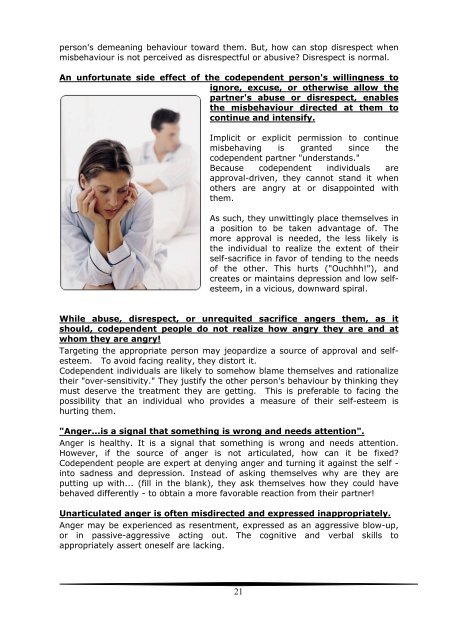personality disorders explained
Antisocial Personality Disorder, Codependence, Narcissism and Borderline
Antisocial Personality Disorder, Codependence, Narcissism and Borderline
You also want an ePaper? Increase the reach of your titles
YUMPU automatically turns print PDFs into web optimized ePapers that Google loves.
person's demeaning behaviour toward them. But, how can stop disrespect when<br />
misbehaviour is not perceived as disrespectful or abusive? Disrespect is normal.<br />
An unfortunate side effect of the codependent person's willingness to<br />
ignore, excuse, or otherwise allow the<br />
partner's abuse or disrespect, enables<br />
the misbehaviour directed at them to<br />
continue and intensify.<br />
Implicit or explicit permission to continue<br />
misbehaving is granted since the<br />
codependent partner "understands."<br />
Because codependent individuals are<br />
approval-driven, they cannot stand it when<br />
others are angry at or disappointed with<br />
them.<br />
As such, they unwittingly place themselves in<br />
a position to be taken advantage of. The<br />
more approval is needed, the less likely is<br />
the individual to realize the extent of their<br />
self-sacrifice in favor of tending to the needs<br />
of the other. This hurts ("Ouchhh!"), and<br />
creates or maintains depression and low selfesteem,<br />
in a vicious, downward spiral.<br />
While abuse, disrespect, or unrequited sacrifice angers them, as it<br />
should, codependent people do not realize how angry they are and at<br />
whom they are angry!<br />
Targeting the appropriate person may jeopardize a source of approval and selfesteem.<br />
To avoid facing reality, they distort it.<br />
Codependent individuals are likely to somehow blame themselves and rationalize<br />
their "over-sensitivity." They justify the other person's behaviour by thinking they<br />
must deserve the treatment they are getting. This is preferable to facing the<br />
possibility that an individual who provides a measure of their self-esteem is<br />
hurting them.<br />
"Anger...is a signal that something is wrong and needs attention".<br />
Anger is healthy. It is a signal that something is wrong and needs attention.<br />
However, if the source of anger is not articulated, how can it be fixed?<br />
Codependent people are expert at denying anger and turning it against the self -<br />
into sadness and depression. Instead of asking themselves why are they are<br />
putting up with... (fill in the blank), they ask themselves how they could have<br />
behaved differently - to obtain a more favorable reaction from their partner!<br />
Unarticulated anger is often misdirected and expressed inappropriately.<br />
Anger may be experienced as resentment, expressed as an aggressive blow-up,<br />
or in passive-aggressive acting out. The cognitive and verbal skills to<br />
appropriately assert oneself are lacking.<br />
21

















